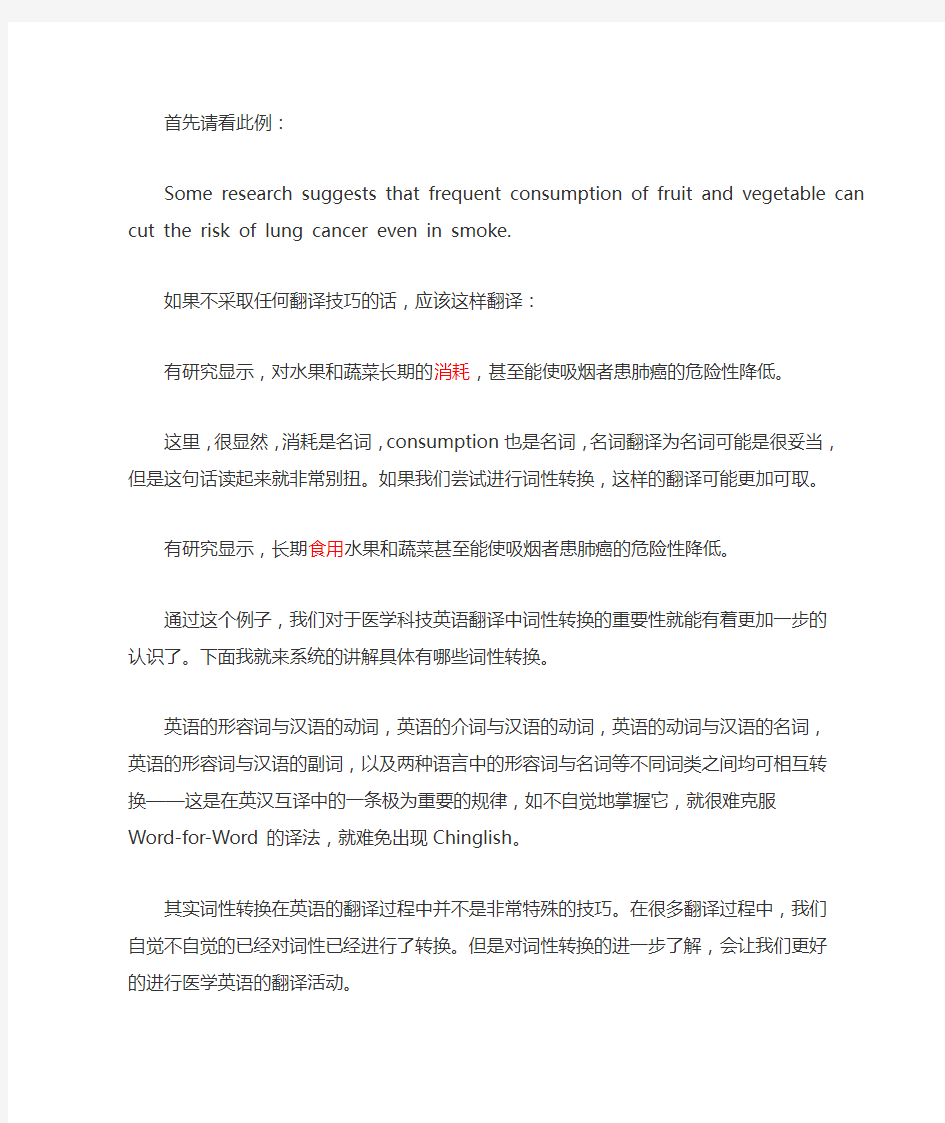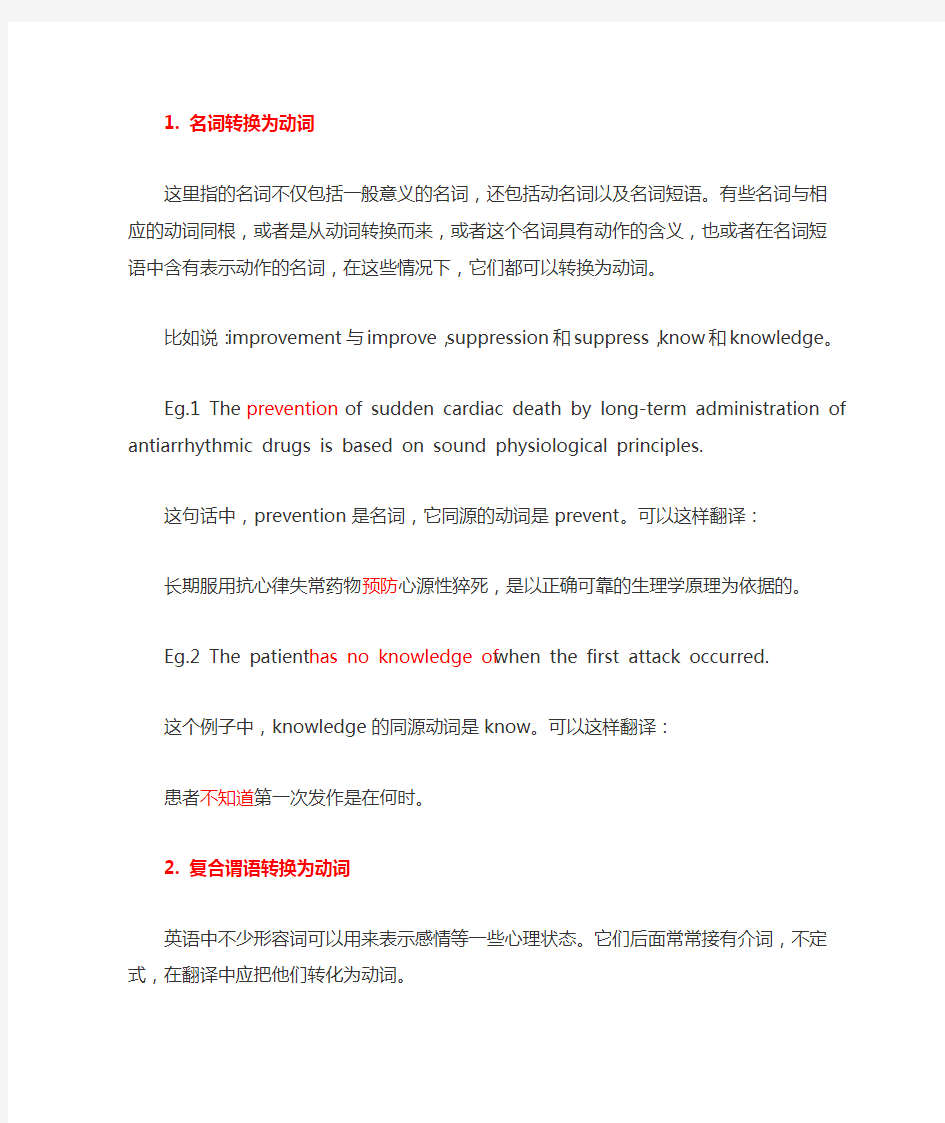第二讲:词性转换


首先请看此例:
Some research suggests that frequent consumption of fruit and vegetable can cut the risk of lung cancer even in smoke.
如果不采取任何翻译技巧的话,应该这样翻译:
有研究显示,对水果和蔬菜长期的消耗,甚至能使吸烟者患肺癌的危险性降低。这里,很显然,消耗是名词,consumption也是名词,名词翻译为名词可能是很妥当,但是这句话读起来就非常别扭。如果我们尝试进行词性转换,这样的翻译可能更加可取。
有研究显示,长期食用水果和蔬菜甚至能使吸烟者患肺癌的危险性降低。
通过这个例子,我们对于医学科技英语翻译中词性转换的重要性就能有着更加一步的认识了。下面我就来系统的讲解具体有哪些词性转换。
英语的形容词与汉语的动词,英语的介词与汉语的动词,英语的动词与汉语的名词,英语的形容词与汉语的副词,以及两种语言中的形容词与名词等不同词类之间均可相互转换——这是在英汉互译中的一条极为重要的规律,如不自觉地掌握它,就很难克服Word-for-Word的译法,就难免出现Chinglish。
其实词性转换在英语的翻译过程中并不是非常特殊的技巧。在很多翻译过程中,我们自觉不自觉的已经对词性已经进行了转换。但是对词性转换的进一步了解,会让我们更好的进行医学英语的翻译活动。
1. 名词转换为动词
这里指的名词不仅包括一般意义的名词,还包括动名词以及名词短语。有些名词与相应的动词同根,或者是从动词转换而来,或者这个名词具有动作的含义,也或者在名词短语中含有表示动作的名词,在这些情况下,它们都可以转换为动词。比如说:improvement与improve,suppression和suppress,know和knowledge。
Eg.1 The prevention of sudden cardiac death by long-term administration of antiarrhythmic drugs is based on sound physiological principles.
这句话中,prevention是名词,它同源的动词是prevent。可以这样翻译:
长期服用抗心律失常药物预防心源性猝死,是以正确可靠的生理学原理为依据的。
Eg.2 The patient has no knowledge of when the first attack occurred.
这个例子中,knowledge的同源动词是know。可以这样翻译:
患者不知道第一次发作是在何时。
2. 复合谓语转换为动词
英语中不少形容词可以用来表示感情等一些心理状态。它们后面常常接有介词,不定式,在翻译中应把他们转化为动词。
比如:apt to(易于,往往),aware of (知道),conscious of (意识到),desirous of (希望),illustrative of (能说明),sick of(讨厌),suspicious of (怀疑),used to (习惯于)……
Eg.3 With some experience in epidemiology I became conscious of the critical importance of epidemiology in providing a scientific basis for any preventive program.
流行病学的某些经验使我开始意识到,在为任何疾病预防计划提供科学依据时,流行病学是极其重要的。
Eg.4 When one is suspicious of the reliability of the history told by the patient himself, it should be checked against information obtained from his family or acquaintance.
怀疑病人自诉病史的可靠性时,就应当对照其家属或熟人提供的情况来加以核实。
3. 介词(短语)转换为动词
英语中不少介词其实具有动作的含义,可以起到动词的作用。翻译中应该译成相应的动词。
比如,
Eg.5 The diagnosis should not be made unless the lung fields are clear on
X-rays.
除非经X光检查肺野清晰,否则就不应做出诊断。
再看以下例子。在以下例子中,这些介词意义太多了,但是在任何一个字典里,都很难看到以下意义。因此,提示我们在翻译中,应根据上下文的含义进行一定的推测,再找出符合语境的含义。切忌生硬的翻译。
Patients with acute nephritis 患急性肾炎的病人
Get the patient out of danger 使病人脱离了危险
From the burnt area into the general circulation 从烧伤部位进入全身循环
4. 动词转换为名词
翻译中,常将一些含义抽象的动词转换为名词。
Eg.6 Endocrinology is defined as the study of the ductless or endocrine glands and their internal secretions.
内分泌学的定义是:研究没有导管的或称内分泌性的腺体及其内分泌液的科学。Eg.7 Bronchiectasis differs from chronic bronchitis in that the former is more of a localized disease.
支气管扩张与慢性支气管炎的区别在于前者更是一种局限性疾患。
Eg.8 For example, like acetaminophen, it produces primarily a depressive reaction and does not produce the acid-disturbance that characterizes
salicylate.
例如,像醋氨酚(扑热息痛)那样,它主要产生一种抑制性反应,并不引起酸碱平衡失调,而后者正式水杨酸盐的特点。
类似的短语还有:
Aims at…目的在于
Differs from…区别在于…
5. 形容词转换为名词
英语中有些形容词,在前面加上定冠词就转化为名词,另有一些形容词则可直接转化为名词。这是构词法的内容之一。
Eg.9 They did their best to help the sick and the wounded.
他们尽了最大的努力帮助病号和伤员。
6. 名词转换为形容词
名词前加上不定冠词,一般是用作表语等成分。在翻译为汉语时,可转换为形容词。
Eg.10 The clinical trail was quite a success.
临床试验非常成功。
Eg.11 Successful experiments in immunology have proved a great hope in its further application as a powerful therapeutic and diagnostic weapon.
免疫学方面的成功试验业已证明,进一步将其作为一种治疗和诊断的有效手段是十分有希望的。
7. 形容词转换为副词
当英语名词转化成汉语动词时,原先修饰英语名词的形容词,显然需要相应地转换成汉语副词。
Adj. +n. --------->adv. + n.
Eg.12 The modern world is experiencing rapid development of science and technology.
当今世界,科学技术正在迅速地发展。
Eg.13 Such ecologic transformations can be responsible for apparent therapeutic failure or exacerbations during antibiotic therapy.
在抗生素治疗中,这种生态学转换可能使治疗明显地失败,甚至造成病情恶化。
本期作业:
翻译下列语句,并指出该语句中的词性转换属于哪一个类型。
1. The prolonged use of systemic antibiotics in acne may result in a distinctive syndrome that is exceptionally difficult to deal with.
2. A wealth of information hs accumulated which strongly indicates that the low density lipoprotein is one of the primary components in the atierogenic process.
3. Here, we outline strategies for identification of patients at risk and for prevention and possible treatment of this important entity of chronic pain.摘自丁香园《医药生命科学动态跟踪》
https://www.360docs.net/doc/827876162.html,/bbs/post/view?bid=116&id=11977450&sty=3&keywords= prevention
4. In fact, in patients with insulin resistance (ie, metabolic syndrome), decreased insulin-induced uric acid excretion may account for the observed uric acid derangements.
摘自American Heart Journal,2004,Effects of statin treatment on uric acid homeostasis in patients with primary hyperlipidemia
(完整)高中英语词性转换常见词汇
词性转换总结与归纳 动词变名词 announce—announcement通知 equip 装备---equipment 装备,器材(不可名) settle—settlement定居,安定 achieve---achievement 成就 amuse--amusement 娱乐 manage---management 经营管理 advertise--- advertisement广告 agree— agreement同意disgree—disagreement不同意 argue---argument争吵commit—commitment奉献 develop---development发展 govern 统治—government 政府 describe—description描写,描绘erupt—eruption爆发 affect—affection影响 satisfy—satisfaction满意,满足select—selection挑选,选择
permit—permission允许admit—admission承认,允许invite—invitation 邀请,请帖devote—devotion献身,专注apply—application申请,申请书produce—production生产,产品protect—protection保护 educate-----education教育consider—consideration考虑attract—attraction 吸引力,吸引instruct—instruction 指导,介绍discuss—discussion 讨论appreciate—appreciation感激,欣赏recognize—recognition认出conclude—conclusion 结论 decide----decision 决定compete—competition比赛 express 表达----expression 词语;表达方式graduate 毕业—graduation operate—operation操作,动手术organize----organization 组织imagine—imagination 想象力
词性转换常见规律归纳
动词变名词1.v+ ment 结尾 achieve---achievement 成就advertise---advertisement advertising agree— agreement argue---argument争吵announce --- announcement 通知amuse--- amusement 娱乐commit奉献—commitment develop---development disgree—disagreement equip装备---equipment装备,器材govern 统治—government 政府manage---management 经营管理settle--- settlement 定居 2.V+ tion 结尾以t, te, de, 结尾的动词常去E 或直接加ion admit 承认—admission attract吸引—attraction 有吸引力的事或人;令人向往的地方 conclude—conclusion 结论compete—competition竞争,比赛discuss—discussion 讨论educate-----education decide----decision describe—description描写,描绘organize----organization imagine—imagination 想象力introduce—introduction 介绍instruct—instruction 指导,介绍invent—inventor / invention illustrate 阐明,举例说明--illustration invite—invitation inspire---inspiration 灵感,鼓舞人心的pollute----pollution 污染 predict---prediction 预言pronounce ---pronunciation resolve 决心-----resolution 决心impress 给人印象—impression 印象 permit 允许-----permission suggest-建议,暗示--suggestion solve解决-----solution 解决方法 3.V+ ance 结尾 allow—allowance 允许appear—appearance 外貌,出现perform----performance 演出exist—existance 存在 4.V+ ing 结尾 bathe 洗澡---bathing end 结束----ending 结尾,结局train 训练---training mean ---- meaning 意义say-----saying 谚语 5.V+ 其他 beg(乞讨)—beggar 乞丐 sit--seat 座位
英语词性转换
动词变名词 1. v+ ment 结尾 achieve---achievement 成就 advertise--- advertisement// advertising agree—agreement apartment 公寓amusement 娱乐argue---argume nt争吵 commit 奉献一commitment compliment 称赞,恭维 2.V+ tion 结尾 admit 承认一admission attract吸引一attraction有吸引力的事或人; con clude— con clusi on 结论compete— competiti on 竞争,比赛discuss— discussi on 讨论educate -------------- education disgree—disagreement department 局,部experiment 实验,试验equip 装备---equipment 装备,器材govern 统治—government 政府manage---management经营管理 令人向往的地方 illustrate 阐明,举例说明--illustration invite —invitation inspire---inspiration 灵感,鼓舞人心的 decide --- d ecision describe—description 描写,描绘express 表达expression 词语;表达方式 graduate 毕业—graduation operate 操作,动手术—operation organize --------------- organization imagine—imagination 想象力introduce—introduction 介绍instruct—instruction 指导,介绍invent—inventor / invention 3.V+ ance 结尾allow—allowance 允许appear—appearance 外貌,出现4.V+ ing 结尾bathe 洗澡---bathing end 结束-- ending 结尾,结局 train 训练---training 5.V+ 其他 Beg(乞讨)—beggar乞丐sit--seat 座位believe—belief 信仰behave 行为,举止--------- behavior know---knowledge fly —flight 飞行heat 加热---heat 热量hit 撞击hit 轰动一时的人或物, 碰撞 pollute --- pollution 污染 predict---prediction 预言pronounce ---pronunciation resolve 决心-- resolution 决心impress 给人印象—impression 印象permit 允许-- permission suggest-建议,暗示--suggestion solve 解决- solution 解决方法 perform - performance 演出exist—existance 存在 mean --- meaning 意义 say ---- saying 谚语 employ--employer 雇主,老板 --employee 雇员 mix 混合 --- mixture 混合物 press 按,压一pressure 压力receive—receptionist 接待员serve—service 服务succeed-- success tour 在--- 旅游,在-- 作巡回演出直接+ 地点tour China ---tour 旅游/ develop---development
常见词汇词性转换
常见词形变化动词变名词 1.v+ ment 结尾 achieve---achievement 成就advertise--- advertisement// advertising agree— agreement appoint----appointment disappoint----disappointment disagree --- disagreement amuse----amusement 娱乐 argue---argument争吵commit—commitment奉献develop---development equip ---equipment 装备,器材govern 统治—government 政府manage---management 经营管理 2.V+ tion/sion 结尾 admit—admission承认attract—attraction 有吸引力的事或人; conclude—conclusion 结论compete—competition 竞争,比赛consider---consideration discuss—discussion 讨论 decide----decision describe—description描写,描绘direct---direction determine---determination educate-----education explain----explanation express ----expression graduate—graduation hesitate---hesitation invite—invitation imagine—imagination 想象力introduce—introduction 介绍instruct—instruction 指导,介绍invent—inventor / invention illustrate --illustration inspire---inspiration 灵感,鼓舞 人心的 impress—impression operate—operation organize----organization permit---permission pollute----pollution predict---prediction prepare---preparation pronounce ---pronunciation resolve -----resolution 决心 suggest --suggestion solve -----solution satisfy----satisfaction 3.V+ ance /ence结尾 allow—allowance 允许appear—appearance 外貌,出现disappear---disappearance 消失perform----performance --performer exist—existence 存在 4.V+ ing 结尾 bathe 洗澡---bathing end 结束----ending 结尾,结局train 训练---training mean ---- meaning 意义say-----saying 谚语 5.V+ 其他 able---ability---disable assist----assisitant analyze---analysis arrive-- arrival到达 beg(乞讨)—beggar 乞丐believe—belief 信仰 behave ----behavior die---dead----death employ--employer雇主--employee雇员 know---knowledge
打印英语单词词性转换的基本规律
打印英语单词词性转换 的基本规律 Document serial number【NL89WT-NY98YT-NC8CB-NNUUT-NUT108】
英语单词词性转换的基本规律 动词(v.)→名词(n.) (a)词形不变,词性改变 例如:work,study,water,plant等可以用作动词(工作,学习,浇水,种植),也可以用作名词(工作,学习,水,植物). (b)一些动词在词尾加上-er或-or之后就变成了表示"某一类人"的名词 例如:work—worker,teach—teacher,sing—singer, jump—jumper,play—player,learn—learner, visit—visitor,invent—inventor, collect—collector等. 注意:1)以不发音的e结尾的动词,在词尾加-r. 例如:drive—driver,write—writer等. 2)以重读闭音节结尾,且末尾只有一个辅音字母的动词,应双写末尾的辅音字母,再加-er 例如:run—runner,win—winner,begin—beginner 等. (c)在动词词尾加上-ment变成名词 例如:achieve—achievement(成就) advertise—advertisement//advertising(广告) agree—agreement disgree—disagreement amuse—amusement(娱乐) improve—improvement(争吵) commit(奉献)—commitment develop—development(发展) depart—department(局,部) govern(统治)—government(政府) manage—management(管理) equip—equipment(装备) 有些单词比较特殊,需把动词后的e去掉再加ment.例如:argue—argument(争论) (d)在动词词尾加上-(t)ion/(s)ion变成名词 例如:attract—attraction;instruct—instruction; invent—inventiondiscuss—discussion; express—expressioneducate—education; graduate—graduation;operate— operation(去e再加"ion") compete—competition;organize— organization(把e改成其他字母再加"tion")decide—decisionconclude—conclusion(把de改 为s再加"ion") describe—description描写,描绘(这是特例,不规则变化) (e)在动词词尾加上-ance变成名词 例如:appear—appearance(外貌;出现) perform—performance(演出) accept—acceptance(接受) (f)在动词词尾加-ing变成名词(方法与动词变为现在分词的方法相同) 例如:meet—meetingbuild—buildingwait— waiting bathe—bathingsay—saying(谚语)mean—meaning end—endingtrain—trainingwash—washing 注意:以重读闭音节结尾,且末尾只有一个辅音字母 的动词,应双写末尾的辅音字母,再加-ing 如:swim—swimmingshop—shoppingbegin—beginning (g)其他一些比较特殊的变化 例如:Beg(乞讨)—beggar(乞丐)behave(行为举止)—behavior know(知道)—knowledge(知识)fly—flight(飞行) heat(加热)—heat(热量)hit(撞击)—hit(轰动一时的人或物,碰撞) mix(混合)—mixture(混合物)press(按,压)—pressure(压力) sit(坐)—seat(座位)succeed—success(成功) tour—tour(旅游)/tourist(游客) 2.动词(v.)→形容词(adj.) (a)动词后面加able,以e结尾的动词则去e加able,表示具有此性质,特点或属性. 例如:afford-affordable;love-lovable (b)动词后面加ed,以e结尾的动词则直接加d,表示被动性的属性或特点. 例如:scatter-scattereduse-used (c)不规则的动词则必须记忆,记住其过去分词形式.规律不大,意义同(b). 3.名词(n.)→形容词(adj.) (a)在名词后面加-y可以变成形容词(尤其是一些与天气有关的名词) 例如:rain—rainy,cloud—cloudy,wind— windy,snow—snowy,health—healthy,luck—lucky,anger—angry guilt—guilty(内疚的)tourist—touristy(游客多的), salt(盐)—salty(咸的)
(完整版)英语词性转换归纳
英语词性转换归纳 动词变名词 1.v+ ment 结尾 achieve---achievement 成就 advertise--- advertisement// advertising agree— (in )agreement apartment 公寓 amusement 娱乐 argue---argument争吵 commit奉献—commitment compliment 称赞,恭维 develop---development disgree—disagreement department 局,部 experiment 实验,试验 equip 装备---equipment 装备,器材 govern 统治—government 政府 manage---management 经营管理 2.V+ tion 结尾 attract吸引—attraction 有吸引力的事或人;令人向往的地方 conclude—conclusion 结论 compete—competition 竞争,比赛 discuss—discussion 讨论 educate-----education decide----decision describe—description描写,描绘 express 表达----expression 词语;表达方式 graduate 毕业—graduation operate 操作,动手术—operation organize----organization instruct—instruction 指导,介绍 invent—inventor / invention invite—invitation inspire---inspiration 灵感,鼓舞人心的--- pollute----pollution 污染 predict---prediction 预言 pronounce ---pronunciation resolve 决心-----resolution 决心 permit 允许-----permission
常见中考词性转换汇总练习
常见上海中考词性转换汇总 注:供大家中考复习时参考,其中带*为2018新增词汇(汇总词汇中个别单词可能与2018考纲有差异,特此说明。) _________ v.使…能够,使… 有能 力的 _________ adj. 能够;有能力的 n. 能力;才能 ____________ prep. 穿过;横过 v. 穿越/ n. 十字,叉 ___________ n. 行动;扮演 _________ a. 积极的 _____________ n. 活动 ___________ n. 男演员 __________ n. 女演员 _________ v. 增加 _______________ n. 增加 _____________ n. 优点,优势,有利条件 _______________ n. 不利,劣势,短处 __________ n. 年龄 a. 年老的 __________ a. 活着的;活泼的
___________ v. 居住;生活 (lives复数)n. 生活;生命 ___________ v. 使消遣,娱乐 _____________ adj.引起乐趣的 n. 娱乐,消遣,娱乐活动____________ a. 生气的 ad. 生气地 _________ n. 艺术 n. 艺术家 _____________ n. 澳大利亚 a./n.澳大利亚的/人 ___________ v. 出现 v. 消失 ______________v. 吸引 _______________ n. 吸引,吸引力,吸引物______________a. 有吸引人的 __________ n. 根据地,基地,基础 _____________ adj. 基本的,基础的 _________________ a. 漂亮的 _________________ ad. 美丽地 ___________(began, begun) v. 开始 __________________ n. 开始,开端 ___________ adj. 感到乏味的,厌倦的
词性转换规律
一.形容词变副词规律小结
二.名词复数的变化规律 1、规则变化 1) 一般情况直接在词尾加-s . 如:chair—chairs;apple—apples;grape—grapes; 2)以s、sh、ch、x等结尾的词加–es .如:bus—buses;watch—watches;box—boxes;brush —brushes 3)以辅音字母+y结尾的词,变y 为i 再加es,baby—babies;city—cities;family—families 4)以f或fe结尾的将f或fe直接换成ves. 如:knife—knives;thief—thieves;shelf—shelves 2、不规则变化 1)没有规律的变化。如:child—children;foot—feet;tooth—teeth;mouse—mice; woman—women等。 2)单复同形。如:deer—deer;sheep—sheep;fish—fish;yuan—yuan;tofu—tofu; pork—pork等。 3)以o结尾的名词有的加es有的加s. 如:potato—potatoes;tomato—tomatoes;Hero—heroes 二、动词第三人称单数的变化规则 1)直接在动词后+s. 如:like—likes;play—plays;read—reads;get—gets;help—helps; ski—skis等。 2)以s, x, sh, ch, 接尾的动词:+es. 如:wash—washes;wacth—watches;teach—teaches; brush—brushes等。 3)以辅音+o接尾的动词:+es. 如:go—goes;do—does等。 4)以辅音+y接尾的动词:变y为i+es. 如:fly—flies;study —studies;carry—carries; sky—skies等。 末尾字母y前为元音字母的,直接在动词后面加-s. 如:play—plays;say—says 5)特殊变化。如:be—is;have—has等。这些没有规律,需要加强记忆。 三、动词现在分词-ing形式的构成 1)一般情况在动词原形后加-ing . 如:go—going;stand—standing;climb—climbing等。2)以不发音的e结尾的动词,去掉e,再加-ing. 如:write—writing;hope—hoping;care—caring 3)以-ie结尾的动词应先将e去掉,将i变成y然后再加-ing. 如:die—dying,tie—tying等。4)如果动词最后一音节为重读闭音节,最后一个字母需要重复. 如:run—running; stop—stopping;hop—hopping;plan—planning;star—starring;但辅音x是个例外,无需重复(x其实起着两个辅音的作用)。如:tax—taxing,relax—relaxing等。 5)以-ee,-oe,-ye结尾的动词加-ing时应保留词尾e. 如:see—seeing;hoe—hoeing;eye—eyeing 6)-ic结尾的动词应先在字母c后加一字母k再加-ing. 如:panic—panicking; picnic—picnicking 三.动词变名词小结 1.在词尾加er,r ,双写加er 或or: A. play _ player, sing _ singer, wait _ waiter , find _ finder, thrill _ thriller
(完整版)英语词性转换大全
英语词性转换 1. 名词变形容词 (a)在名词后面加-y可以变成形容词(尤其是一些与天气有关的名词)例如:rain—rainy,cloud—cloudy,wind—windy,snow—snowy, health—healthy,luck—lucky,anger—angry guilt—guilty(内疚的)tourist—touristy(游客多的),salt (盐)—salty (咸的) silk(丝绸)—silky(丝绸般的),sleep—sleepy (昏昏欲睡的) 注意:1)如果以重读闭音节结尾,且词尾只有一个辅音字母,这时应双写辅音字母再加“-y”。如:sun—sunny,fun—funny,fog—foggy(有雾的),fur—furry(毛皮的) 2)少数以不发音的e结尾的名词变为形容词时,应去掉e再加“-y”。 如:noise—noisy,ice—icy,shine—shiny(发亮的),taste(口味)—tasty(甜的)(b)名词后面加-ed,以e结尾的直接加d。 例如:spot(斑点)—spotted(有斑点的);talent—talented (有天赋的)organize—organized 有组织的;balance—balanced(平衡的) (c)一些抽象名词在词尾加-ful可以变为形容词 例如:care—careful,thank—thankful,help—helpful, use—useful,meaning—meaningful (d)在名词后加-less构成含有否定意义的形容词 例如:care—careless(粗心的),use—useless(无用的) hope—hopeless(没希望的),home—homeless(无家可归的) (e)一些以-ce结尾的名词,把-ce改为-t变成形容词 例如:difference—different,silence—silent,confidence—confident (f)。在名词后加-ly变为形容词 例如:friend—friendly,love—lovely,live---lively (g)。在名词后加-ous变为形容词 例如:danger—dangerous (h)名词后面加-al变为形容词 例如:music—musical;medicine—medical (这个比较特殊) (i)名词后面加-able变为形容词,如果以e结尾就去e再加“-able”。 例如:adjust—adjustable 可调整的value—valuable有价值的 (j)名词后面加-en变成形容词 例如:wood—wooden 木制的wool—woolen 羊毛的 (k)一些表示国家的名词可以在词尾加-ese,-ish或-n构成表示国籍,语言的形容词 例如:China—Chinese,Japan—Japanese,England—English, America—American,India—Indian,Australia —Australian (注意Canada—Canadian)
任务型阅读常用词汇词性转换
任务型阅读常用词汇词性转换 动词变名词 1.v+ ment 结尾 achieve---achievement 成就 advertise--- advertisement// advertising agree— agreement apartment 公寓 amusement 娱乐 argue---argument争吵 commit奉献—commitment develop---development disgree—disagreement department 局,部 experiment 实验,试验 equip 装备---equipment 装备,器材 govern 统治—government 政府 manage---management 经营管理 2.V+ tion 结尾 admit 承认—admis sion attract吸引—attraction 有吸引力的事或人;令人向往的地方conclude—conclusion 结论 compete—competition 竞争,比赛 discuss—discussion 讨论 educate-----education decide----decision describe—description描写,描绘 express 表达----expression 词语;表达方式 graduate 毕业—graduation operate 操作,动手术—operation organize----organization imagine—imagination 想象力 introduce—introduction 介绍 instruct—instruction 指导,介绍 invent—inventor / invention invite—invitation pollute----pollution 污染 predict---prediction 预言 pronounce ---pronunciation impress 给人印象—impression 印象 permit 允许-----permission suggest-建议,暗示--suggestion solve解决-----solution 解决方法 3.V+ ance 结尾
英语词汇 词性转换——其他
形容词变名词 efficient有效率的—efficiency 效率 patient—patience/impatience dependent—dependence依赖性 independent—independency 独立性 true—truth high—height wide—width long—length possible—possibility responsible—responsibility urgent—urgency 紧急 prosperous—prosperity 繁荣 accurate—accuracy 准确性 形容词变动词 modern—modernize social--socialize fast--fasten short/shorten long—lengthen—length(n.) wide--widen less--lessen strong—strengthen—strength(n.) large—enlarge 名词变动词 computer—computerize 名词---形容词—副词 beauty 美,美人—beautiful—beautifully care—careful—carefully
care—careless—carelessly difference---different---differently fortune—fortunate—fortunately/unfortunately happiness—happy—happily hunger—hungry--hungrily health—healthy—healthily luck—lucky—luckily noise—noisy—noisily pride—proud—proudly骄傲地 sadness—sad—sadly safety 安全;安全的地方—safe—safely silence—silent---silently 默默地 success—successful—successfully truth—true—truly unluck—unlucky—unluckily wonder 奇迹—wonderful—wonderfully 方位的词名词—形容词 East—eastern West—western South—southern North---northern In the west of China In the western part of China 四大洲名词-----形容词 Africa 非洲----- African Europe欧洲----- European America 美洲-----American Asia 亚洲–---- Asian
英语单词词性转换的基本规律
英语单词词性转换的基本规律 (1.动词(v.)→名词(n.) (a)词形不变,词性改变 例如:work, study, water, plant等可以用作动词(工作,学习,浇水,种植),也可以用作名词(工作,学习,水,植物). (b)一些动词在词尾加上-er或-or之后就变成了表示"某一类人"的名词 例如:work—worker, teach—teacher, sing—singer, jump—jumper, play—player, learn—learner, visit—visitor, invent—inventor, collect—collector等. 注意:1)以不发音的e结尾的动词,在词尾加-r. 例如:drive—driver, write—writer等. 2)以重读闭音节结尾,且末尾只有一个辅音字母的动词,应双写末尾的辅音字母,再加-er 例如:run—runner, win—winner, begin—beginner等. (c)在动词词尾加上-ment 变成名词 例如:achieve—achievement (成就) advertise—advertisement//advertising(广告) agree—agreement disgree—disagreement amuse—amusement (娱乐) improve—improvement(争吵) commit(奉献)—commitment develop—development (发展) depart—department (局,部) govern(统治)—government(政府) manage—management (管理) equip—equipment (装备) 有些单词比较特殊,需把动词后的e去掉再加ment. 例如:argue—argument(争论)
英语词性转换方法及类型
英语词性转换类型 (1).动词转化为名词, post-postage mail-mail weigh-weight advise-advice (2)动词转化成名词-形容词 act-actor / actress-active change-change-changeable (3) 动词转化成形容词,副词,名词 fill-full,need-necessary-necessarily interest(v. / n.) interested /interesting (4)n. a. n. a.名词转化为形容词 person personal ( 个人的; 私人的 ) fun funny (5)n. pl. n. pl.名词转化为名词复数 gentleman gentlemen human humans (6)a. ad. a. ad.形容词转化为副词 possible possibly probable probably (7)a. ad. n.形容词转化为副词,名词 true truly truth lucky luckily luck (8)原级比较级最高级 far farther / further farthest / furthest little less least 英语词性转换方法 一、名词变为形容词的方法 1. 在名词后面加-y可以变成形容词(尤其是一些与天气有关的名词)。 例如:rain—rainy, cloud—cloudy, wind—windy, snow—snowy, health—healthy, luck—lucky等。 注意:1)如果名词以重读闭音节结尾,且词尾只有一个辅音字母,这时应双写词尾的辅音字母再加-y。如:sun—sunny, fun—funny等。 2)少数以不发音的e结尾的名词变为形容词时,应去掉e再加-y。例如:noise—noisy, ice—icy 等。 2. 一些抽象名词在词尾加-ful可以变为形容词。 例如:care—careful, thank—thankful, help—helpful, use—useful, beauty—beautiful等。 3. 一些表示国家的名词可以在词尾加-ese, -ish或-n构成表示国籍、语言的形容词。 例如:China—Chinese, Japan—Japanese, England—English, America—American, India—Indian, Australia —Australian(注意Canada—Canadian)。 4.在名词后加-ous变为形容词。 例如:danger—dangerous等。 5. 在名词后加-ly变为形容词。 例如:friend—friendly, love—lovely等。 6.在名词后加-less构成含有否定意义的形容词。 例如:care—careless(粗心的),use—useless(无用的),hope—hopeless(没希望的),home—homeless(无家可归的)等。 7. 一些以-ence结尾的名词,把ence改为ent变成形容词。 例如:difference—different, silence—silent等。 二、动词变为名词的方法 1.词形不变,词性改变。 例如:work, study, water, plant等可以用作动词,也可以用作名词。 2. 一些动词在词尾加上-er或-or之后就变成了表示“某一类人”的名词。 例如:work—worker, teach—teacher, sing—singer, jump—jumper, play—player, learn—learner, visit—visitor, invent—inventor等。
词性转换必备
词汇转换大全 v. n. adj. appoint appointment appointed disable ability; disability able; unable;disabled absent absence absent absolute absorb absorbed accept acceptance acceptable access access accessible accident accidental; accomplish accomplishment accomplished achieve achievement achievable act action/actor/actress activity active addict addiction addicted add addition additional adjust adjustment adjustable admire admiration admirable admit admission advance advance advanced advantage advantage advantageous advertise advertisement advise advice age age aged agree agreement agreeable agriculture agricultural allow allowance allowable amaze amazement amazing / amazed ambition ambition ambitious amuse amusement amusing / amused analyze analysis analytic anger angry (angrily) announce announcement annoy annoyance annoying annual annual anxiety anxious apologize apology apologetic appear appearance apply applicant/applicatio n appreciate appreciation approve approval argue argument arrange arrangement arrive arrival
词性转换规律汇总
词类转换分类记忆I.形容词——副词 1、加ly quiet安静的quick 快速的slow慢的beautiful美丽的bright明亮的careful仔细的certain一定clear清楚 loud大声 sad难过的 wide广泛 serious严重的 usual通常 final最后 safe安全 real真的 recent最近的 main主要 accurate精确的 2、去y加ily easy容易的heavy大量angry生气的hungry饥饿的happy 快乐的lucky幸运的3、le结尾的,去e变y possible可能gentle轻柔的4、不变 hard难的;努力地,猛烈地fast 快 early早late 晚enough足够straight笔直II. 动词——名词 1、加er、or、ress 加er farm 耕种—农民 drive 驾驶—驾驶员司机teach 教—老师work 工作—工人
write 写—作家 report 报道—记者 win 赢(winner)—获胜者own 拥有—owner拥有者paint画、粉刷---画家manage 经营—经理record 记录—录音机 加or act--actor 男演员 visit—visitor观光者 invent--inventor 发明家 calculate—calculator计算器 加ress wait—waitress女服务员act—actress女演员2、加ion结尾 add—add i tion 加collect—collection 收集discuss—discussion讨论decide—decision决定invent—invention发明物invite—invitation 邀请operate—operation手术pollute—pollution 污染review—revision 复习solve—solution解答organize—organization组织locate—location地点suggest—suggestion建议protect---prote ction 保护 3、加ing begin—begi nn ing开始build—building大楼say—saying 谚语paint—painting 绘画
